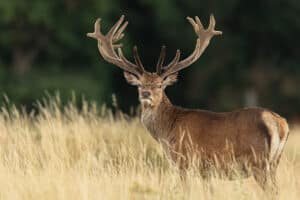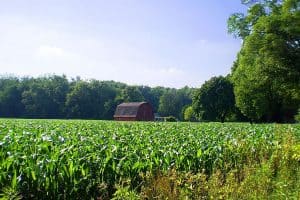Poachers are more than a nuisance for rural landowners. The subject of poachers has been on mind for several weeks, but literally hit home last weekend, when a first-time guest from North Carolina hunted whitetail deer on our family-owned Alabama land. As our guest was watching the foodplots where he was posted, four armed men appeared from the woods a mere 35 yards away. He began frantically texting me about the intruders. I was mortified; this could have gone south in a hurry. I climbed down from my stand several hundred yards away and raced the four wheeler to his position. The poachers made a quick get-away onto an adjoining owner as they heard me approach. He was okay, and the men hadn’t seen him. I was grateful he was okay, and that no confrontation had occurred.
Later that evening as our group of hunters gathered for supper, I heard numerous stories from other landowners that had encountered trespassers and poachers on their lands. In most states there is a legal distinction between trespassers and poachers. A trespasser is one who “oversteps his bounds” onto the lands of another, while a poacher is one who trespasses with the intent of taking an animal. I learned that in Alabama the legal assumption is that if a person trespasses on your land with a firearm they are poaching.
Poaching is a nationwide epidemic. Missouri reported 2000 arrests for deer poaching in 2009 alone! The fact that so many property owners have had to deal with this issue prompted me to contact a local conservation officer and sheriff’s deputy for advice about preventing poachers on their lands. Here are a few of the key points that these officers shared with me.
1. Poachers generally look for easy targets. Land held by owners who are out of the area and that doesn’t see much use is going to be a prime area for poachers to visit. By looking for tire tracks on the driveway or woods roads it is easy to tell if a property is being used. One method of prevention I have seen an out-of-town owner employ is giving the local game warden or other law enforcement officer permission to hunt and use his tract of land. This type of information spreads quickly in poaching communities. If you are unable to visit your property often, have someone in the area check on it for you. Having someone patrolling your property will make it more difficult for a poacher to find uninterrupted time to do their dirty work.
Posting the boundaries of your property against trespassing, hunting and fishing may be required in some states. I would also recommend installing a well-constructed gate to entrances from the road and putting strong locks on them. Leaving a drive open may be irresistable to thieves and poachers. Consider adding a dusk-to-dawn light near cabins or sheds to increase the appearance of usage.
2. Who finds the poachers? The conservation officer I spoke to said it is far more likely for a landowner to find a poacher than for a game warden. His reasoning was that his jurisdiction covers 900 square miles of land and 150 miles of shoreline and there are only two officers to patrol it. I figure I have a better chance of meeting a Sasquatch in the woods than a game warden. Poachers know this too based on a conversation I had with a man who has been convicted of 20+ counts of shooting deer at night. He and several others were targets of an undercover sting by North Carolina conservation officers. He lost his hunting license for five years and had to pay nearly $6,000 in fines.
3. What should a landowner do if he encounters poachers? “ If at all possible avoid confrontation.” was the advice of this game warden. Generally poachers are armed, and they are already breaking the law, so they may resort to violence to avoid capture. A local friend confronted three men who were hunting on his land, and they beat him severely and left him in the woods.
This officer said if you catch a poacher on a game camera and they can be clearly identified, that is a “go directly to jail” card for them. He also said if you do observe them gather as much detail as possible about their appearance, clothing, weapons, vehicles, atv, or anything else pertinent that could help the officer identify and capture a law-breaker. If you happen upon someone and can get them to give you their name, id, or weapon that will be a help to the conservation officer. I have heard of two different local owners, upon catching people hunting on their land, had the trespassers surrender their rifles. The owners told the poachers they could retrieve the their belongings from the game warden. After 20 years, I believe the game warden still has one of those rifles.
Poaching is not only a recreational activity for these criminals, it is also a means to make money. Poachers will often sell the racks or mounts of trophy animals for a huge sum of money. In 2009, a Minnesota man claimed to have arrowed what would have been a world-record 8-point whitetail. Further evidence revealed the animal had been shot with a rifle. He was convicted of poaching and pled guilty to lesser charges. It was reported that a sporting goods store offered the Minnesota DNR $200,000 for the antlers.
Poachers violate many rights of landowners, and potentially pose a threat to their lives. Safety is by far the most important concern when dealing with poachers. Conservation departments in many states are trying to find ways to battle this blight, and 35 states have teamed up to form the Interstate Wildlife Violator Compact which helps make sure that poachers who are caught breaking the law are brought to justice throughout the country. Texas has a good program called “Operation Game Thief” where they have a mobile “Wall of Shame” display of animals taken illegally. Minnesota had a similar display, but in a cruel twist of irony, thieves stole their DNR’s “Wall of Shame“. Conservation officials across the nation have taken a hard line against poachers in recent years, handing out stiff penalties for these crimes. I was surprised at how severe when I read Outdoor Life’s recent article about the “50 Worst Poaching Fines Ever“.
The bottom line is protecting the lives and livelihoods of private landowners. To get a good grasp on what the laws of your state or individual county are, I would recommend contacting your local game warden of conservation department. During a 15 minute conversation I gained some helpful insights about how to prevent poachers from invading our land again. You will also have rapport with the officer should you ever encounter an issue with poachers or trespassers. Those officers will be glad to assist you in protecting your land, and will welcome any help you can provide as they do their job.
Continue the conversation about landowner rights and the issue of poaching at the LANDTHINK Community. I started a poll to see how other landowners address this situation. Please take a moment and share your experience or vote in the poll. We look forward to hearing from you in the forums.
This content may not be used or reproduced in any manner whatsoever, in part or in whole, without written permission of LANDTHINK. Use of this content without permission is a violation of federal copyright law. The articles, posts, comments, opinions and information provided by LANDTHINK are for informational and research purposes only and DOES NOT substitute or coincide with the advice of an attorney, accountant, real estate broker or any other licensed real estate professional. LANDTHINK strongly advises visitors and readers to seek their own professional guidance and advice related to buying, investing in or selling real estate.









I live in Texas and just found 4 males and one female on my property’ what originally alerted me to their presence was I heard five shotgun blasts in quick sucession, close to my house. I investigated and looked with my trust binoculars and saw them, each wathing out for the other. I stuck my gun out the window at them and they acted like they didn’t see it, slowloy but surely moved out of sight. Bottom line is whjen I found their vehicle, at the back of it was 2 huge hogs and one huge deer. Then there was some animal that looked like a cow or really big deer that they tied a rope in a tree and went inside to inform husband. This is bull. A sherrif that lived close by told me I can shoot anyone on my property without my consent with proper markings. I don’t want to shoot anyone, however I also will not tolerate anyone coming on my property killing deer that my house is the only safe-zone in my part of Texas…sad to say. I hunt, yes, but not in my yard or acreage. Can someone tell me who to report this to although I don’t have all of the information, but some is better than none. Thank you.
Should have shot the hell out of them, that would’ve nipped your problem right in the bud. Lucky you to live somewhere where illegal trespassers can be shot, not all of us have that luxury.
I live in Dover ar where the poachers harass me to keep me from being outside anytime they wish to hunt. They even attempt to control when I sleep so they have full use of the night time. They cut fences, damage property and more to get me to move so they can have the land to poach freely. They will not buy the land because they do not want to pay for the houses that are just in their way. They are well organized and feel justified as the city has determined that my property lies in their claimed hunting zone.